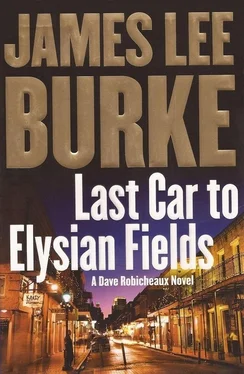“Tell me about it,” the other man replied. His blond hair was combed straight back from a receding hairline, and he kept leaning forward, reverentially, each time the other man spoke. But the man with the birthmark was silent now, not interested in whatever the blond man had intended to say. The blond man, who wore a pair of electrician’s wire snips in a leather case on his belt, tried again. “His house was so dried out a popcorn fart could have set it on fire but he blames me for it. He tried to screw me with the Better Business Bureau and get my license pulled.”
But the man with the birthmark, whom Clete had now connected with the name Will Guillot, only sipped his coffee and looked out the window at the bayou and the antebellum home on the far side of the steel bridge.
“You think he sent that doctor to your house?” the moon-faced man said.
“Probably.”
“You’re a mean machine, Will.”
“Nope.”
“The guy came at you with a sawed-off shotgun?”
“He thought he could go into a man’s house and kick ass. He lost. End of story,” Will Guillot said.
“ Pow! ” his friend said.
Both men became silent, eating slices of apple pie, drinking their coffee, picking their teeth. Clete went to the rest room, then waited for his check. The men in the other booth were talking about football now. Go home, he thought. You don’t need any more bad luck today.
He looked out the window and saw the child of Will Guillot’s girlfriend playing on a swing set, a cheap one that was probably bought at Wal-Mart. The skip’s fall partner, the sex predator, pulled up next door, talked to the boy briefly, tousling his hair, then went inside his trailer.
Clete paid his check and started toward the door. He paused, thinking to himself, then reset his porkpie hat and walked back to Will Guillot’s table. He grinned without speaking, his Hawaiian shirt partially unbuttoned on his chest, his eyes flicking sideways as though he did not know how to introduce himself.
“Help you?” Guillot said.
“You guys were in the Crotch?” Clete said.
“The what ?” the blond man said.
“I heard you say something about a ‘mean machine,’ so I thought you were talking about Mother Green’s Mean Machine. See, jar-heads call Lejeune—”
“Yeah, I know all about that. What can I do for you?” Guillot said.
Clete cleaned an ear with one finger, looking sideways again as he did it, his face filling with thought. “I think I know who you are,” he said.
“You do?” Guillot said.
“You popped a doctor from Loreauville in your driveway. Guy was some kind of weirded-out Vietnam vet, right? That’s some kind of irony, huh? Guy probably had a thousand AK rounds shot at him, then loses his Kool-Aid and gets smoked in the suburbs.”
Guillot looked across the table at his friend and tapped his fingernail on the cover of his wristwatch. The two men started to get up.
“Whoa,” Clete said.
“Whoa, what ?” Guillot said.
“The lady up there in the trailer, the one you’re banging? She’s got a little boy. The guy next door happens to be a sex predator. So while you’re getting your twanger taken care of, the freak who was just patting her kid on the head is figuring out ways to sodomize him. My suggestion is you take your mind off your dick long enough to move the lady and her son out of that shithole before the kid’s life is ruined. Can you relate to that?”
“You’ve got some fucking nerve,” Guillot said.
The owner of the cafe had come from behind the counter and was standing behind Clete now, resolute, his feet planted, his thumb raised in the air.
“Out,” he said.
“No problem,” Clete said. He pulled two one-dollar bills from a brass money clip and dropped them on his table.
But outside Clete could not give it up, standing by his car door, flipping his keys back and forth, his face growing darker. He watched Will Guillot and the electrical subcontractor with him get in their car. “Hold on a minute,” he said.
“Get a life, queer bait,” Will Guillot said from the passenger window as his car rolled past Clete.
Clete watched the two men cross the steel bridge over the Teche and turn down the tree-shaded back road that led past the row of antebellum homes. In his mind’s eye he saw himself running them off the road, strolling back to their car, his blackjack in his side pocket, moving the situation on up to the full-tilt boogie. Why not? he thought. The day couldn’t get any worse than it was already.
He got into his Caddy, slammed the door, and turned the ignition. He heard a dry, clicking sound, then nothing. The battery was as dead as a butcher block.
It took an hour for a filling station a half block away to send a truck that gave him a quick-start. He sat behind the wheel, revving the engine to charge the battery, oil smoke pouring from under the frame, bird-shit smears on his clothes, all immediate hope of squaring the beef with Will Guillot gone.
He looked through the windshield at the trailer slum by the bayou and the parolee who was now drinking a can of beer on his steps and talking to the little boy from next door.
Clete retrieved a pair of leather work gloves from under the seat and put them in his pocket, then dropped the Caddy into low gear and rolled into the trailer slum, gravel and oyster shells ticking softly under his tires.
“You Bobby Joe Fontenot?” he said.
The man on the steps was relaxed, smoking a cigarette with his beer, barefoot in the sunshine, his arms flecked with blue tattoos done by a needle improvised from the guts of a ballpoint pen. He wore imitation black leather pants and a tie-dyed strap undershirt, his black hair scalped on the sides and braided into a matador’s pigtail in back.
“I’m gonna take a guess. Casting director from, what’s that TV show called, Survivor ?” he said, squinting against the sunlight.
Clete grinned and got out of the Caddy, opening his badge holder briefly. “Looking for your friend who jumped his bond with Wee Willie Bimstine and Nig Rosewater,” he said. “Slipped his cuffs this morning and left me with shit on my nose.”
“Haven’t seen him.”
“Mind if I look inside?”
“Get yourself a beer. It’s in the icebox.”
“Thanks,” Clete said, and gave him the thumbs-up sign.
Clete stepped inside. The garbage can in the small kitchen was overflowing, the counters covered with pizza and fried-chicken cartons.
A television set was playing without sound, the VCR under it lighted, a cassette pushed halfway into the loading slot. Clete shoved the cassette all the way into the unit with his thumb and waited for the video image to transfer to the screen. Then he clicked off the set and the figures on the screen shrank to a small dot. He slipped on his work gloves and called through the screen door: “Did you know you have a gas leak in your stove?”
Bobby Joe stepped inside the trailer, sniffing at the air. Clete drove his fist into Fontenot’s stomach, burying it to the wrist, so deep he actually felt bone. Then he kicked the wood door shut, flung him headlong into a wall, and pulled a shelf filled with carnival midway ceramics down on top of him. He ripped the cassette from the VCR and bounced it off Bobby Joe’s face, then rooted in the refrigerator’s freezer compartment and pulled out a box of Popsicles and threw them in Bobby Joe’s face, too.
“You get the kids in here with cartoons and ice cream?” he said.
Bobby Joe tried to raise himself up against the wall, spittle running from the corner of his mouth. “I’m in treatment. Ask my P.O.,” he said hoarsely.
Clete opened and closed his huge hands, breathing hard, his cheeks pooled with color. He lifted Bobby Joe by his shirt and belt and threw him into the narrow bathroom at the back of the trailer. Bobby Joe grabbed the side of the lavatory and tried to raise himself up again, his face bewildered.
Читать дальше












